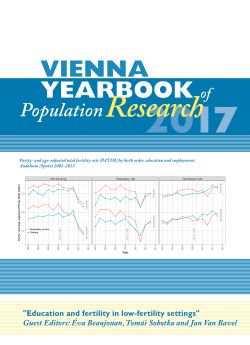
Vienna Yearbook of Population Research 2017, pp. 121-141, 2018/06/18
Special issue on Education and fertility in low-fertility settings

This paper utilizes an untapped data source containing information about completed fertility rates and many explanatory variables to elaborate the education-fertility link. Indicators of the theory of value change and rational choice theory are tested as possible explanations for this relationship. A Poisson regression is used to analyze data from the fourth wave of the European Values Study, with the number of children as the dependent variable. The association between education and fertility is found to be generally negative and stronger for women. The findings also indicate that opportunity costs and liberal values are stronger predictors of fertility among women than among men, and largely explain the more negative effect of education on women. Additional analysis of different welfare regimes reveals that the multivariate association between education and fertility remains significant only for the post-communist countries of Europe.